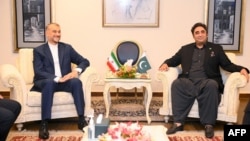Iran announced Thursday its readiness to help urgently complete and operationalize a long-delayed multibillion dollar pipeline to export natural gas to neighboring Pakistan.
Iranian Foreign Minister Hossein Amir Abdollahian, on a three-day visit to Islamabad, made the remarks after delegation-level talks with his Pakistani counterpart, Bilawal Bhutto Zardari.
"We held important discussions on how we can find solutions to some existing banking and financial problems between the two countries within the framework of the international rules and regulations," Abdollahian told a joint news conference without elaborating. He spoke through his official interpreter.
Tehran maintains that it has finished constructing the nearly 2,700-kilometer pipeline on its side of the border to export Iranian gas to the energy-deficient South Asian neighboring country and is waiting for Islamabad to complete its part of the project.
Pakistani officials told a parliamentary committee hearing earlier this year the agreement that the two countries signed nearly a decade ago requires Pakistan to complete its portion of the pipeline by March 2024 or pay $18 billion in financial penalties to Iran.
Islamabad maintains that sanctions the United States has imposed on Iran over its nuclear program have deterred Pakistan from constructing the pipeline.
Cash-strapped Pakistan reportedly sent a delegation to Washington in March to request the U.S. administration to allow Islamabad to build the pipeline or help pay the expected financial penalty. The mainstream Pakistani Dawn newspaper reported at the time that "Washington is still reviewing the request."
Speaking Thursday, the Iranian foreign minister underscored the project's importance for both countries but did not say if Tehran would ask for the penalty in case Islamabad fails to meet the completion deadline.
"We do believe that the completion of the Iran-Pakistan gas pipeline is definitely going to serve the national interests of these two countries," Abdollahian said.
Zardari, reading from a written statement, said he discussed a wide range of bilateral and regional issues with his Iranian counterpart but did not discuss the fate of the gas pipeline project.
Officials in Islamabad have consistently maintained they remain committed to the pipeline, calling it an "important project that symbolizes the friendship between Pakistan and our neighbor."
Last May, Iran and Pakistan jointly inaugurated a marketplace and a power transmission line along their nearly 900-kilometer border in a significant move aimed at expanding bilateral, regional trade and energy cooperation.
Abdollahian said Thursday that in his discussions with Zardari, the two sides agreed to double the annual volume of bilateral trade to $5 billion. He said more border marketplaces would also be set up in the coming months to help enhance the business activity.
"Both sides remain committed and determined to get away from borders mostly characterized by security concerns and issues and move more towards making them as points of interaction, making them borders of economy and trade that can serve the interest of the two countries," the Iranian chief diplomat said.
Insurgent attacks on both sides of their shared border have long strained relations between Iran and Pakistan. Both sides accuse the other of not doing enough to deny sanctuaries to militants operating on their respective soils.




